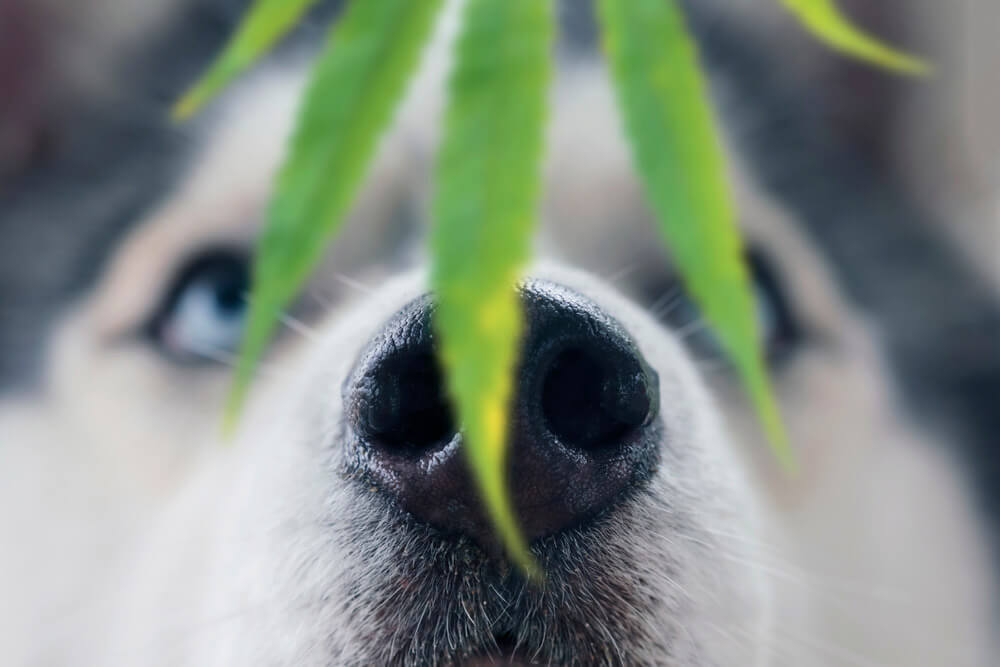
Best CBD Oil For Dogs: The Ultimate Guide For Dog Owners
Introduction to CBD Hemp Oil for Dogs
Cannabidiol (CBD) is a compound found in the cannabis plant. While marijuana may be the most well-known form of cannabis, CBD oil is derived from the drug’s safer and more medicinal cousin—hemp.5 People have been using hemp for medicinal purposes for nearly 1,000 years, and the world of holistic veterinary science is embracing CBD oil for its healing properties. Evidence shows it’s a natural and effective treatment for a growing list of medical and behavioral issues in dogs.

There are over 60 chemicals found in the cannabis plant, and they’re all called cannabinoids. Out of those 60, there are two main types: cannabidiol (CBD) and tetrahydrocannabinol (THC). Most people recognize THC as the psychoactive substance in marijuana that makes you high, but CBD is not as familiar. As a therapeutic cannabinoid, isolated CBD oil is safe and non-psychoactive. It stimulates the body’s endocannabinoid system to promote overall healing and wellness.8
The endocannabinoid system is an interconnected chain of receptors found in the brain, nervous system, glands, and organs. It’s the body’s command center for controlling health and healing, and its main job is to maintain balance within the body. All mammals—humans and dogs included—rely on the endocannabinoid system to regulate immune response. CBD oil interacts with receptors to act as a natural neuroprotective agent with multiple health benefits. CBD oil opens up two-way communication between endocannabinoid receptors to allow the body to either increase or decrease the immune response as needed.2 CBD oil is the natural way of regulating the system to maintain the perfect balance.
Table of Contents
- For What Reasons Are Dog Owners Using CBD Oil?
- Will CBD Oil Make My Dog High?
- Is CBD Oil Legal?
- What Scientific Studies Have Been Done on CBD Oil in Dogs?
- What Side Effects or Risks Are Involved with Giving CBD Oil to My Dog?
- What Dosage of CBD Oil Should I Give My Dog?
- How Long Before CBD Oil Starts Working for My Dog?
- How Do I Choose a Quality CBD Oil Product?
- Which CBD Product Does iHeartDogs Recommend?
- Real Dog Owner’s Experiences with CBD Oil
- Additional Resources
- Sources and Citations
For What Reasons Are Dog Owners Using CBD Oil?
A few internet searches will review dog owners are using CBD for a plethora of reasons, some of which include:
- Mobility support, especially in aging dogs
- Lack of appetite
- Dogs experiencing stress from separation
- Excessive barking
- Nausea from car rides
- Stressful car rides or trips to the vet or groomer
- Aid in recovery from surgery or illness
- Pacing or inability to relax
- Fear of thunderstorms, fireworks or other loud noises
- Aggression toward other dogs
- Constant scratching from seasonal itchiness or other causes
In an effort to understand the most common reasons pet owners gave CBD to their dogs, and whether the product was perceived to be working, we set out to survey our readers who had claimed to use it.
A survey was conducted with iHeartDogs readers in February of 2018. A total of 196 readers completed the survey who had recently given CBD hemp oil to their dogs for various reasons. The following graphs represent their responses:
Question: For what purpose did you give CBD oil to your dog?
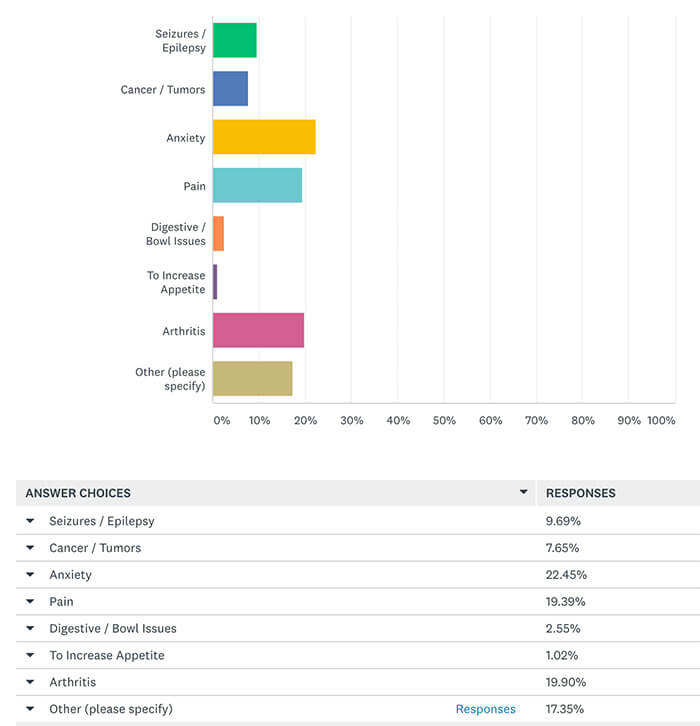
Question: How effective do you feel CBD oil was for your dog’s condition?
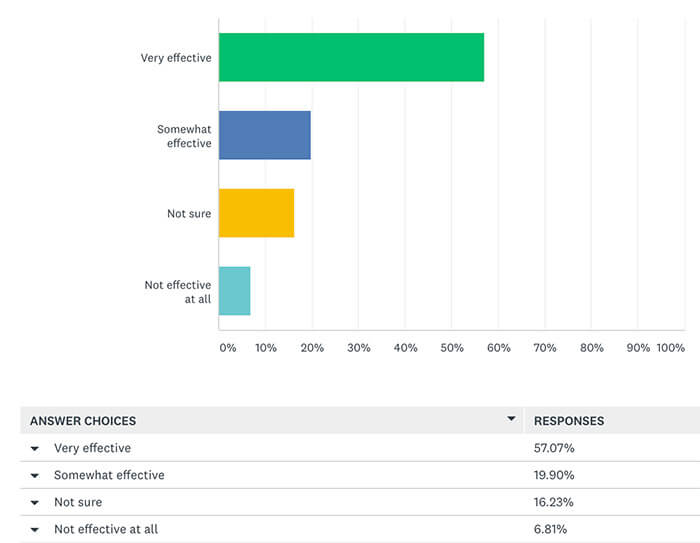
Let’s dive into the most common reasons given, and how CBD may be able to help.
CBD Oil for Mobility Challenges in Dogs
PetCareRx reports 20% of all dogs will suffer from the effects of joint discomfort sometime in their lives.11 Whether the main cause is due to genetics or age, joint discomfort always reduces a dog’s quality of life. It can start as mild discomfort, but it can eventually turn into chronic health problems that stop them from doing the activities they love.

Conventional treatment options for joint discomfort include weight management, exercise, surgery, steroid injections, and pain medications. Those paths, however, aren’t right for every dog. Holistic vets often recommend CBD oil for a safer and more affordable alternative.
See also: CBD Oil For Dogs For Mobility
CBD Oil for Aiding Discomfort
With endocannabinoid receptors located throughout the body, the effects of CBD oil target different areas experiencing nerve-related discomfort. Dogs diagnosed with acute pancreatitis, for example, experience sudden and debilitating abdominal discomfort usually accompanied by vomiting and lack of appetite. CBD can prompt the body’s systems to start the appropriate response to bring the body back into balance.
RELATED: CBD for Discomfort Management in Dogs: A Beginner’s Guide

In addition to discomfort caused by pancreatitis, studies have also been done on the effectiveness of CBD oil in decreasing the influence of oxidated stress caused by free radicals. Oxidated stress leads to premature aging and all the bodily aches and discomfort that comes with it. Dog owners also choose to take advantage of the general healing properties of CBD oil by administering it after an injury, illness, or surgery.
See also: CBD Oil For Dogs With Discomfort
CBD Oil for Calming Support
Holistic vets often recommend CBD oil for dogs that suffer with separation stress, phobias, and general stress. It works to support a calm state via communication between endocannabinoid receptors.10 When the CBD oil enters the body, it activates the receptors to initiate better chemical transmissions. CBD oil triggers a response that makes it easier for the body to release tension and calm down.

CBD oil works well with situational stress where a dog owner knows in advance a specific situation is going to cause their dog stress. A trip to the vet’s office, a thunder storm, having guests visit the home, and being left alone during the day are all common situations that can cause stressed dogs to exhibit behavioral problems. Administering CBD oil in advance helps dogs better cope with stressful emotions.13
See also: CBD Oil For Dogs For Calm Support & Stress

RELATED: 10 Myths About CBD for Dogs – A Must Read Guide Before Giving Your Dog Cannabidiol
CBD Oil for Dogs With Seasonal Itchiness
Whether it’s pollen, mold, or a type of food, the body mistakenly identifies that particular substance as threatening. The body attempts to protect itself by signaling cells to release chemicals. One of those chemicals is called histamine.7 Histamine causes a number of symptoms including itchiness, hives, swelling, and nasal congestion.
Recent studies show CBD oil may also stop the body from releasing histamine. A study published in Pulmonary Pharmacology & Therapeutics looked at the validity of using CBD oil to reduce the effects of a common histamine trigger—raw egg whites. The study was done on guinea pigs and found CBD reduced the animals’ airway obstruction that resulted from released histamine.23 Combined with the capability of reducing itchiness, evidence suggests CBD oil is a viable way to help with itchy skin in dogs and humans.6
RELATED: Complete Guide to CBD Oil and Dog Itchiness
Will CBD Oil Make My Dog High?
The short answer to the question on everyone’s mind is, no, CBD oil cannot and never will make you or your dog high. The reason why goes back to the two types of cannibinoids found in cannabis—CBD and THC. Marijuana contains the mind-altering THC that when smoked or ingested leads to a type of euphoric or hazy mindset. Hemp, however, contains only insignificant traces of THC.9 While the average strain of marijuana contains between 15% and 30% THC, hemp-derived CBD oil contains less than .3%. It’s possible to purchase high-quality CBD oil with zero traces of THC, but as long as the percentage is less than .3, it’s impossible to make your dog high. For maximum safety, however, we strongly recommend purchasing a CBD product where 100% of the THC has been removed (these products are a lot more rare)
RELATED: Which CBD Product Does iHeartDogs Recommend?
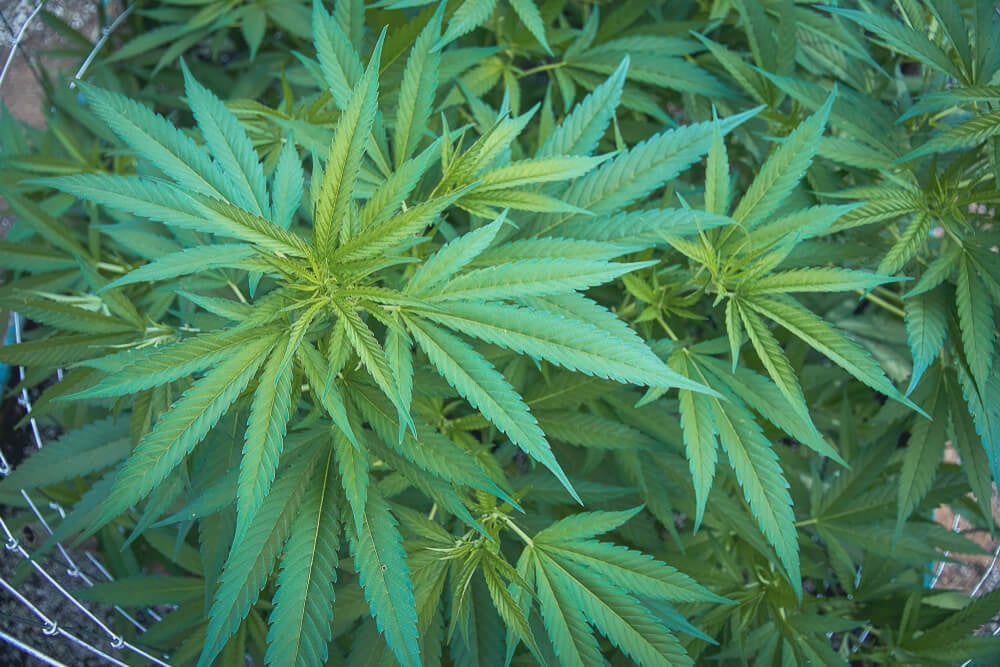
Is CBD Oil Legal?
Yes, CBD oil derived from hemp is legal in all 50 states.2 CBD oil from hemp is a completely different product than THC-rich marijuana, but the complex legality of cannabis in general is an obstacle deterring consumers from taking advantage of CBD oil. Only half of states have legalized marijuana for medical purposes, but CBD is legal no matter what state you live in.

The laws regarding legality, however, are confusing. The problem comes in when considering the fact CBD oil doesn’t always come from hemp. Marijuana also contains CBD, and even in its isolated form, it’s still considered a marijuana product and therefore illegal in many states.14 This difference has caused serious confusion among both consumers and manufacturers of CBD from hemp.
Related: Compare Pet Insurance Quotes from all The Major Brands
The important thing to remember is that as long as the CBD oil comes from hemp, and not marijuana, it is completely legal to both purchase and possess in every state.
What Scientific Studies Have Been Done on CBD Oil?
While research on CBD oil is still new, there are several human studies confirming it to be a viable treatment method for a number of medical conditions. The research is based off the human endocannabinoid system, which scientists and medical professionals already know to be the same for all mammals. This information suggests the studies done on humans can also be translated to use in dogs.16 Confirmation will come as veterinarians push for more studies done on using CBD oil for veterinary purposes. Veterinary researchers are optimistic that because CBD oil is being proven to be an effective treatment for humans, future studies on dogs will show similar results.
CSU Study on CBD Delivery Method
In 2016, Colorado State University completed work on a pharmacokinetic study of CBD in healthy dogs that was the first to demonstrate the compound was measurable in the blood. The study suggests that CBD usage in dogs is safe enough to warrant studies in a clinical population.24
For the study, 30 healthy dogs were given 2 different dosages CBD in 3 different methods of delivery: capsules, oil tincture, and a cream applied on the skin. The results showed that CBD given orally in an oil tincture was most absorbed and bioavailable to the body. (This is why we always recommend buying CBD in a tincture instead of CBD treats).
CBD Helps Mice With Acute Pancreatitis
Mice showed evidence that cannabidiol treatment successfully reduces enzyme activity within the pancreas organ tissue. CBD showed properties that lead to “improved pathological changes.”19
Generalized Social Stress
Researchers administered doses of either CBD oil or a placebo drug to people with a generalized social stress disorder to determine possible anxiolytic properties of CBD. They measured cerebral blood flow before and after treatment and found CBD oil to be associated with decreased subjective stress.21
RELATED: Which CBD Product Does iHeartDogs Recommend?
What Side Effects or Risks Are Involved with Giving CBD Oil to My Dog?
Initial studies show CBD oil is safe for dogs, but veterinary professionals always recommend to start with small doses. There’s still a lot of information researchers don’t know, and it’s best to introduce CBD oil slowly while being alert for possible side effects. Potential side effects found in humans and dogs include:
- Dry mouth
- Tremors
- Lightheadedness
- Drowsiness
- Diarrhea or Vomiting
- Increased appetite
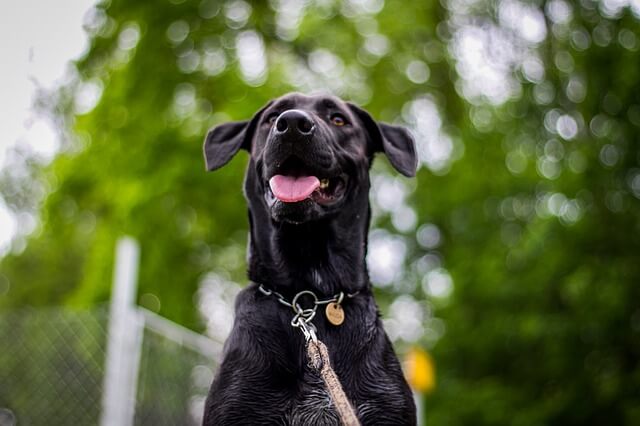
CBD oil may also interact with certain medications as it affects enzymes in the liver. In some cases, this action actually has a positive side effect and helps make the medication more effective.12 As always, speak with a knowledgeable veterinarian about proper dosing and possible side effects before administering CBD oil to your dog.
What Dosage of CBD Oil Should I Give My Dog?
Information on proper dosing of CBD oil is still in the works, but veterinarians recommend starting low and slow to gauge how an individual dog will respond. As a guideline, the current suggested dosing is 1 mg – 5 mg per 10 pounds of the dog’s body weight for the first week.2 If the dog has never taken CBD oil or anything similar in the past, it’s best to start at the lower end of that range. If there are no negative side effects after the first week, the same dosing can be increased to twice a day.
- 10 pounds: 1 mg – 5 mg
- 20 pounds: 2 mg – 10 mg
- 30 pounds: 3 mg – 15 mg
- 40 pounds: 4 mg – 20 mg
- 50 pounds: 5 mg – 25 mg
- 60 pounds: 6 mg – 30 mg
- 70 pounds: 7 mg – 35 mg
- 80 pounds: 8 mg – 40 mg
- 90 pounds: 9 mg – 45 mg
On average, it takes about 30 minutes to notice therapeutic effects. The key to dosing is finding a balance where the dog reaps all the benefits without experiencing side effects. If the dog starts to show signs of a negative reaction, reduce the dosage.
It might also be necessary to increase the dosage over time to maintain the same positive effects. If changes to the dosage need to happen, make them slow and gradual to give the dog’s body time to adjust. Remember, there is no toxicity related to CBD, and it’s impossible to overdose.5 Talk to a vet about what works best for your dog and monitor them after each dose.
In our experience, and in human studies, larger doses were sometimes needed to alleviate symptoms of stress related problems.
How Long Will It Take CBD Oil to Work for My Dog?
Every dog responds differently to CBD oil, and we encourage you to start slow and start small. Always observe your dog after giving them a new supplement for the first time. In general, here’s a rule of thumb:
- Giving CBD directly to your dog’s mouth (sublingually) – Allow 20-60 minutes
- Giving CBD in your dog’s food or treat – Allow 45 – 90 minutes
For more chronic issues, it may take 2 to 4 weeks for optimal results, especially as you experiment with how high of a dose your dog needs in order to get relief.
See also: How Long Does It Take For CBD To Work On Dogs?

How Do I Choose a Quality CBD Hemp Oil Product for Dogs?
Choosing a high quality CBD product can be confusing since the market is currently exploding and your options appear endless.
We’ve put together a buying guide for CBD, containing 8 things to watch out for before making a purchase. You can receive the CBD Oil Buying Guide by iHeartDogs by requesting it below:
The Only CBD Oil Recommended by iHeartDogs.com
We worked hard to create the Cannanine brand of CBD Oil. In addition to containing nano-sized emulsion (best for absorption) the formula is 100% THC free, which is relatively rare but very important for animal use. In addition, each and every purchase provides healthy meals for shelter dogs through our partners at GreaterGood.org!
Cannanine CBD comes in several easy to administer options including oil, soft chews, baked CBD treats, a topical CBD cream for dogs, and an itch calming spray.
Learn more about our Hemp Oil with CBD here.
Real Dog Owner’s Experiences with CBD Oil
Using Facebook, we polled the iHeartDogs audience and ask the following question: “What’s been your experience with giving CBD oil to your dog?” The following are several of the responses we received:
“My almost 11 year old dog has joint discomfort. It started in November. We tried acupuncture (2x a week for a month) then once a week. He was taking herbal meds from the vet, too. His regular vet gave him gabapentin but didn’t work. 2 days before Christmas, he couldn’t walk. My sister came for Christmas eve dinner and brought the CBD oil she got for her dog and we tried it on mine. We gave it to him Christmas eve, morning of Christmas day and by night time he started walking again. Limping but walking and after 3 days of taking it, he’s walking fine.” – Bern Eliazo
Most Frequently Asked Questions About CBD Oil for Dogs
What Is CBD Oil For Dogs?
CBD oil, or cannabidiol oil is a compound that comes from cannabis and hemp. At this time, there are no formal studies in regards to CBD oils effect on dogs. However, there are many pet owners in the world that can vouch for its effectiveness. What is proven is that cannabinoids can interact with endocannabinoid receptors which are found in the central and peripheral nervous systems. As a result, they can help stabilize the body while keeping it in a normal state. CBD oil can be used to for joint discomfort, stress, and other conditions.
What Kind Of CBD Oil Is Best For Dogs?
Full spectrum, broad spectrum, and CBD isolate are three different kinds of CBD oil. Full spectrum CBD has small components of the cannabis plant. If a full spectrum CBD product is federally legal it will contain less than .3 percent THC. Broad spectrum CBD does not contain any THC. However, other components of the cannabis plant are used so it will not be 100% CBD alone. CBD isolate is what it sounds like, a pure product. It only contains CBS itself, no other products. When it comes to CBD oil for dogs, you should use a broad spectrum CBD extract. Cannanine offers CBD products for dogs that contain 0% THC.
Is CBD Oil Bad For Dogs?
In most cases, CBD oil, when it is in its purest form, is safe and well-tolerated by dogs and most animals. This is according to a report released by the World Health Organization in 2017. Subsequently, there have been a few studies conducted that have documented an increase in alkaline phosphatase levels in the liver of canines when ingesting CBD oil on a daily basis. Even with the increased alkaline phosphatase levels, the liver continued to function normally. There are no long-term studies to confirm whether or not an increase of alkaline phosphatase levels has the potential to create more long-term adverse effects. If a dog already has known liver issues, it may be best to avoid any CBD oil regimen due to the fact that CBD is metabolized by the liver. Additionally, it is important to consider the quality and purity of the CBD product before allowing your pet to ingest it. Low-quality CBD may have other ingredients that could potentially be harmful to your pet. Cannanine CBD oil is created with the purity and quality levels necessary to ensure the safe consumption of the product by canines and other animals.
Pros and Cons of CBD Oil For Dogs
If you are considering a CBD oil regimen for your dog to help mitigate symptoms, you may want to consider some of the pros and cons of beginning a CBD oil regimen. As many doctors have touted the benefits of CBD oil for human consumption, the effect of regular CBD oil consumption by canines is still being studied. Here are some of the pros and cons that should be considered.
Pros:
Most veterinarians agree the CBD oil can help: A survey conducted by the Veterinary Information Network concluded that around 79% of active veterinarians with clinical experience using CBD products believe that CBD was helpful for chronic discomfort. Of the same veterans who participated in the study, 62% percent stated they believed CBD oil was effective for canine management of stress. The only side effect that was reported was sedation. CBD is 100% non-toxic and a dog would never be able to consume quantities large enough to have an adverse overdose reaction.
Pet owners have seen positive results: The market for CBD pet products has been quite successful due to the effectiveness that pet owners have experienced. In 2019, the pet CBD market was estimated to possess a market cap of around $400-million. The market is expected to increase to more than $1.7-billion by 2023.
Cons:
The pet CBD market lacks regulation: Since the pet CBD market lacks regulation, it is difficult to tell if the product you are purchasing is free from heavy metals, pesticides, and other potentially harmful chemicals. Ultimately, the FDA has not officially approved the use of cannabis products for animals.
A lack of scientific evidence: Although there is short-term scientific evidence that supports the canine use of CBD products, there still lacks any significant long-term studies that can be conclusive either way.
As with anything, there are potential pros and cons that need to be considered before consuming a particular product. Reviewing these pros and cons, one may conclude that ultimately CBD can be a useful and helpful tool to help their canine friends with particular ailments when a pure product is acquired.
Is CBD Oil Safe For Dogs?
There is no conclusive evidence that CBD oil is unsafe for dogs. CBD oil has been used successfully to treat stress, and discomfort with no evidence of extreme reactions or adverse side effects. A common side-effect of consuming CBD oil is sedation, which is to be expected in both human and animal CBD consumption.
Do Vets Recommend CBD Oil For Dogs?
Many veterinarians may be a little hesitant to fully condone CBD use for dogs due to liability issues, however, they may be able to help pet owners find products that are pure and that have established reputations in the pet CBD oil industry.
What Makes Cannanine CBD Oil For Dogs Better Than Other Brands?
Cannanine’s products are produced in the USA and come with a 100% money back guarantee. Our products contain 0% THC and are made from organic, non-GMO, and human grade ingredients. Every bottle purchased from Cannanine provides 7 healthy meals for shelter dogs. As a veteran owned company, all of Cannanine’s products are proven pure and designed with your pets best interest in mind. Cannanine proudly offers CBD for cats and dogs, CBD oil for cats and dogs, CBD soft chews for dogs, CBD cream for cats and dogs, and CBD treats for dogs.
How Does CBD Oil Work?
Ultimately, CBD oil interacts with receptors in the central nervous system. Additionally, there have been some studies that have concluded that CBD oil can act as an aid to discomfort.
What is better for dogs, hemp oil or CBD oil?
CBD oils have some proven effectiveness when treating stress, discomfort, and other ailments that occur in canines. On the other hand, hemp oil is used more as a nutritional supplement that supports skin health, coat quality, healthy hips and joints, and stronger cardiovascular health, all while promoting overall health and wellness. One would not be considered better than the other as CBD oil and hemp oil are used for different purposes. Both of which can arguably be deemed positive.
What Is The Endocannabinoid System?
Essentially, the endocannabinoid system is a cell-signaling system within the brain and body that is also referred to as ECS. ECS is still being studied, however, some studies have found that the ECS plays a major role in regulating sleep, mood, appetite, memory, and reproduction. It is important to note that the endocannabinoid system exists in everyone even if cannabis is not consumed.
Related: Can CBD Help My Puppy or Dog Sleep Better?
What To Look For When Buying CBD Oil For Dogs?
When shopping for CBD oil for dogs you want to identify brands and products that are organic. If CBD oil is not organic it may contain pesticides. It’s also important to not shop for BCD oil based on price. You should also look for a manufacturer analysis that certifies the amount of CBD that is in the product. It’s best to find a product that contains little to no THC. Cannanine CBD oil product for dogs is both organic and contains 0% THC.
Additional Resources
- 5 Reasons CBD Oil for Dogs Is Exploding in Popularity
- 8 Things To Consider Before Buying CBD Oil for Your Dog
- How CBD Oil Might Help Your Dog’s Separation Stress
- Why CBD Oil Is Becoming So Popular for Dogs with Joint Discomfort
- 6 Reasons Why Everyone Is Talking About CBD Hemp Oil
- 4 Reasons Senior Dog Owners Are Flocking to CBD Oil
- CBD for Dogs: What Scientific Studies or Clinical Trials Have Been Performed?
- CBD Dosing Guide for Dogs
- How CBD Oil Can Help Increase Your Dog’s Appetite and Reduce Nausea
- Can I Give Human CBD Oil to My Dog?
- Can Cannanine™ CBD Oil Be Given to Both Dogs and People?
- How CBD Oil Can Help Your Dog During Fireworks
- What is Better for Dogs: CBD Treats or a CBD Oil Tincture?
- Do I Need a CBD Oil Made Specifically for Dogs?
- Learn About CBD Gummies for Dogs
- CBD Treats For Dogs: Things To Consider Before Buying
Sources and Citations
1. https://www.avma.org/news/javmanews/pages/130615a.aspx
2. https://www.allthebestpetcare.com/information-library/what-hemp-cbd-can-do-for-your-dog-or-cat/
3. https://www.consumerreports.org/seizures/cannabis-oil-cbd-treat-seizures/
4. https://www.petmd.com/dog/care/whats-latest-using-cbd-pet-anxiety-and-pain”
5. http://www.dogsnaturallymagazine.com/cannabis-dog-can-help/
6. https://healinghistamine.com/cannabidiol-for-mast-cell-activation-and-histamine-intolerance/
7. https://www.mayoclinic.org/diseases-conditions/allergies/symptoms-causes/syc-20351497
8. http://medicalhemp.com/cannabidiol/
9. https://ministryofhemp.com/hemp/not-marijuana/
10. https://moderndogmagazine.com/articles/natural-solution-separation-anxiety/98854
11.https://www.petcarerx.com/article/8-ways-to-treat-dog-joint-pain/1403
12. https://www.petmd.com/dog/general-health/cannabis-oil-dogs-everything-you-need-know
13. https://www.petreleaf.com/cbd/pet-anxiety-prevention
14. https://www.preventivevet.com/dogs/what-to-know-if-you-want-to-give-your-dog-cbd-cannabidiol
15. http://www.westword.com/marijuana/colorado-state-university-leading-the-way-in-veterinary-cbd-treatment-9573197
Scientific Studies
17. https://cvmbs.source.colostate.edu/preliminary-data-from-cbd-clinical-trials-promising/
19. https://www.ncbi.nlm.nih.gov/pubmed/22850623
20. https://www.ncbi.nlm.nih.gov/pmc/articles/PMC4157067/
21. https://www.ncbi.nlm.nih.gov/pubmed/20829306/
22. http://molpharm.aspetjournals.org/content/70/3/897.full
23. https://www.sciencedirect.com/science/article/pii/S109455391300059X
24. https://cannanine.com/rimadyl-carprofen-is-there-a-natural-alternative-for-my-dog-are-there-dangers-side-effects/
25. https://www.ncbi.nlm.nih.gov/pubmed/30026641















